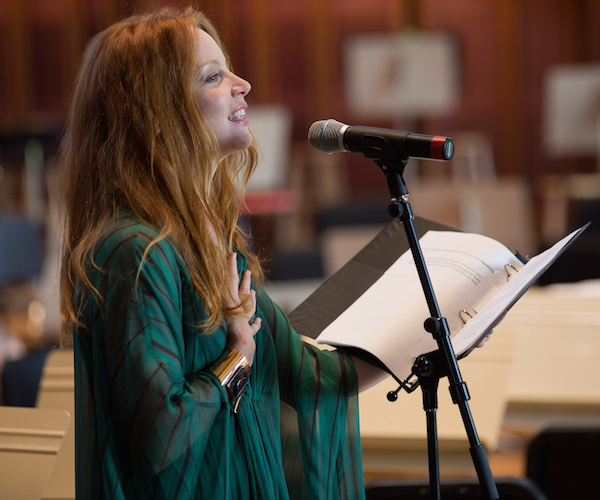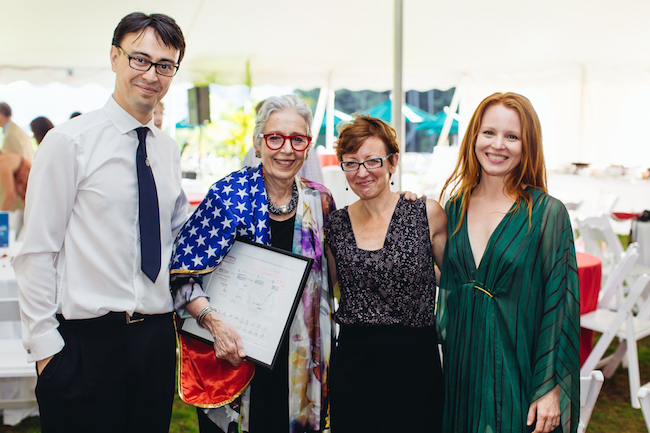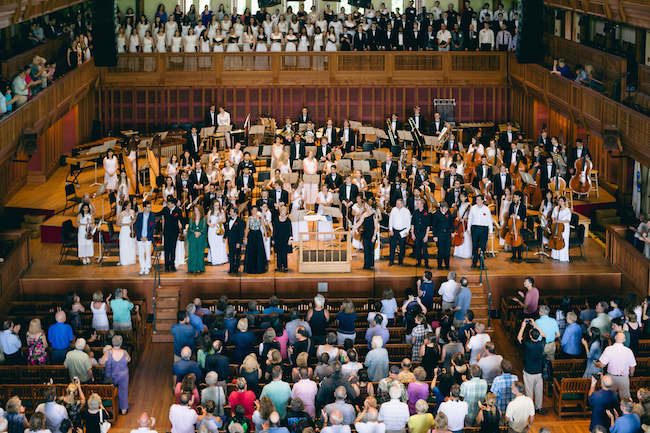Music Commentary: The 50th Anniversary Celebration of the Boston University Tanglewood Institute
If any of you are harboring a budding young musician either at home or school or in the extended family, make sure that he or she know about this glorious program and investigate the possibility of attending BUTI.

Emcee and BUTI alum Lauren Ambrose. Photo: Natasha Moustache.
By Roberta Silman
What a celebration! August 6, 2016 was one of the most glorious days of the Tanglewood summer, and Ozawa Hall was bursting at the seams with the crowd that had come to huzzah the 50th anniversary of the Boston University Tanglewood Institute. This is the program set up for more than 350 students (aged 14 to 22) who come from not only all over the country but all over the world to study for eight weeks at a campus adjoining Tanglewood. There they not only work with professors and staff from Boston University, but also have a chance to meet with and learn from the faculty and the young professionals at the Tanglewood Music Center as well as members of the Boston Symphony Orchestra. Moreover, they have unlimited access to the concerts at Tanglewood, and even have opportunities to collaborate with some of the Tanglewood artists.
BUTI was the brainchild of Erich Leinsdorf back in 1966 and the program has grown amazingly since then. Two years ago I wrote about it and talked to its retiring director, Phyllis Hoffman. Today I will only report on the afternoon concert, which drew a large audience of alumni who were clearly delighted to see each other. The program featured Conductor Ken David Masur (BUTI alum ’96) and presented works from Wagner and Handel to more modern, provocative and often reflective pieces by BUTI alums, Larry Wolfe (BUTI ’66) and Nico Muhly (BUTI ’96 ’97).
It began with the ambitious Overture to Die Meistersinger by Richard Wagner. The stage brimmed with enthusiastic, beautifully dressed young women in white and their male counterparts dressed in black and white, many of them in tuxedos. This is a difficult piece, but they performed it admirably. That was followed by the Allegramente movement from Kodály’s expressive Serenade No. 12 for two violins, Peter Zazofsky and Lucia Lin, and viola, Steven Ansell (BUTI ’71). Then the wonderfully witty piece by Larry Wolfe called It All Starts With Koussy (nickname for the famed conductor of the BSO, Serge Koussevitsky) for 12 double basses, including Brian Perry and Todd Seeber (BUTI ’80) as well as the current double bass students. This was an amalgam of “hits” from Wolfe’s summer of 1966 and you could hear all sorts of echoes, the most famous being that of Brahms’ Academic Festival Overture. Part I ended with Handel’s Coronation Anthem No 1, “Zadok the Priest,” a majestic way to mark a great occasion.

BSO Assistant Conductor Ken-David Masur, longtime Artistic Director Phyllis Hoffman, current BUTI Executive Director Hilary Repass, and Lauren Ambrose. Photo: Natasha Moustache.
After the intermission, everyone seemed to loosen up. The program started off with contributions from contemporary composers Timo Andres (BUTI ’00,’01), Frank Ticheli, and Tarik O’Regan. Each of these talented young musicians provided a memorable and challenging piece. In the Andres work, Land Lines, the brasses ruled, as Andres intended, with “wild echoes flying.” Ticheli’s Earth Song was, in contrast, very peaceful and lovely. That was followed by a very intense excerpt from O’Regan’s Triptych which drew on quotations from Rumi, Wordsworth, and Thomas Hardy. The modern pieces ended with Pulses, Cycles, Clouds by Nico Muhly, who is making a name for himself in both the opera and symphonic worlds. In this vivid work he makes distinctive use of the percussion section — bells, mallet instruments, vibraphone, and other unusual combinations. It is worth quoting Muhly’s remarks in the program:
The piece is meant to echo, in its way, the thrill of community music-making, the joy of sharing a pulse, and the various connections both rhythmic and interpersonal I made at BUTI two decades ago.
It was conducted by Samuel Z. Solomon (BUTI ’95,’96,’97) who is clearly one of those fast friends Muhly made when they were at BUTI together. Other conductors for the contemporary pieces were David Krauss (BUTI ’88) and Katie Woolf (BU College of Fine Arts ’05) and the choral works were conducted — wonderfully — by Ann Howard Jones, Professor Emerita of Music at BU who is clearly beloved by the whole community.
As for the rest of the program, Masur conducted Brahms’s majestic Academic Festival Overture, with tenor Matthew Dibattista (BUTI ’90,’91) and soprano Sara Heaton (BUTI ’99) and the program ended, with the supremely fitting “Make Our Garden Grow” from Leonard Bernstein’s Candide. I only wish that the Tanglewood legend had been here to hear it. He would have been so proud, not only to hear the quality of the music but to know that his ideals are being continued in more than full measure by BUTI.
The whole program was very ably and charmingly narrated by Lauren Ambrose (BUTI ’94, ’95) who as gone on to become a well-known actress. But no report on this important 50th anniversary can omit mention of the great Phyllis Curtin, who died this year and who taught voice at both BU’s College of Fine Arts and BUTI as well as at The Tanglewood Music Center. I was privileged to know her a little, and she was a remarkable artist and woman and a true inspiration to all these programs. I wish that she, too, could have been standing with Bernstein and listening all through this inspiring afternoon.

Current BUTI students and alumni take a final bow at the end of the performance. Photo: Photo: Natasha Moustache.
In conclusion, I hope that if any of you are harboring a budding young musician either at home or school or in the extended family, you will make sure that they know about this glorious program and investigate the possibility of attending BUTI. This is where the arts thrive and where young people can fulfill their dreams and possibly go on to meaningful careers in music and the other disciplines.
Frank Ticheli said it best in the program notes for the poem he wrote for his piece Earth Song:
Earth Song is one of only a few works that I have composed without a commission. Instead, it sprang out of a personal need during a time when so many in this country, including myself, were growing disillusioned with the war in Iraq. I felt a strong impulse to create something that would express my own personal longing for peace….
Normally, I would spend countless hours, weeks, perhaps months, searching for the perfect poem to set. But in this case, I knew I had to write the poem myself, partly because it is not just a poem, but a prayer, a plea, a wish — a bid to find inner peace in a world that seems eternally bent on war and hatred.
But also, the poem is a steadfast declaration of the power of music to heal. In the end, the speaker in the poem discovers that, through music, he is the embodiment of hope, peace, the song within the song. Perhaps music has the power not only to nurture inner peace, but also to open hearts and ears in a world that desperately needs love and listening.
Roberta Silman‘s three novels—Boundaries, The Dream Dredger, and Beginning the World Again—have been distributed by Open Road as ebooks, books on demand, and are now on audible.com. She has also written the short story collection, Blood Relations, and a children’s book, Somebody Else’s Child. A recipient of Guggenheim and National Endowment for the Arts Fellowships, she has published reviews in The New York Times and The Boston Globe, and writes regularly for The Arts Fuse. She can be reached at rsilman@verizon.net.
Tagged: Boston University Tanglewood Institute, Ken-David Masur, Lauren Ambrose
